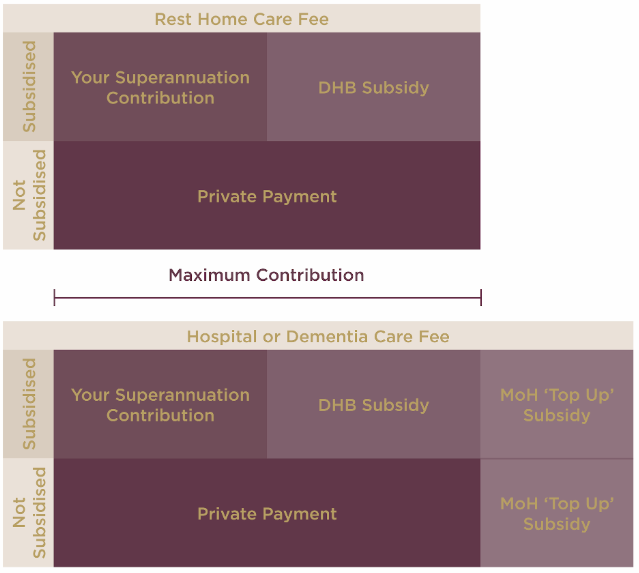Rest Home Costs, Subsidies and Financing - The Definitive New Zealand Guide
Our guide explains rest homes, their ongoing costs, and how to pay for them, covering subsidies, grants, and private payments. We also highlight must-know facts and frequently asked questions.
Updated 6 March 2023
Summary:
Our guide covers:
Know This First: Costs, Government Support and Financing a Stay
- Rest homes and residential care facilities are an important part of the healthcare system in New Zealand, providing a range of care and support services for older people and those with disabilities.
- These facilities offer a range of accommodation options and can provide round-the-clock care and support for people unable to live independently.
- However, rest homes are known to be notoriously expensive and extremely opaque in contractual terms, creating a point of uncertainty for many Kiwis as they navigate their future or plan for a loved one.
- Our guide explains the different types of rest homes and residential care facilities available, the benefits of staying in these facilities, and the different financing options available to help cover care costs.
Our guide covers:
- What’s a Rest Home? How Do They Differ from Residential Care Facilities?
- Understanding the Process of Getting into a Rest Home or Residential Care Facility
- The Pros and Cons of Rest Homes and Residential Care Facilities
- Understanding the Top Private Rest Homes and Residential Care Providers
- How Much Does Staying in a Rest Home Cost?
- How Do You Finance, Fund and Pay for Rest Homes and Residential Care Facilities?
- Financial Subsidies and Government Support for Rest Homes and Residential Care
- Top Resources for New Zealand Rest Homes and Residential Care Facilities
- Must-Know Facts about Financing Rest Homes and Residential Care
- Concluding Comments
- Frequently Asked Questions
Know This First: Costs, Government Support and Financing a Stay
- We estimate the weekly costs to be around $1,300, but this can vary. While data is limited, the average stay in a care home is around 1 year and 8 months per this Stuff.co.nz article from 2018. This means the cost would be around $113,000 (87 weeks X $1,300).
- Government support is available, but it's heavily means-tested, meaning you need to be low on assets and/or income to be eligible for assistance. The asset thresholds are published here and depend on whether you are a single or widowed person in care, a couple (with both of you in care), a couple (with your partner in care, whereby your house and car remain exempt) or a couple with a house and car.
- Most people pay for rest home or similar care by using their savings, having family members (e.g. adult children) contribute, selling a car, home or other assets, and using their ongoing superannuation payments.
- The costs are simple - you either have the funds to pay, whereby you dip into your savings and assets, or you don't, and therefore get your care funded by the state.
- Special specialist organisations provide assistance regarding advice - popular starting points include talking to Seniorline and Eldernet, who help answer specific questions.
- Our guide is the first of its kind in New Zealand to outline the costs and decision-making needed to make an informed decision about what facility to choose and how to pay for it.
- We have written this guide from the perspective of someone researching rest homes or residential care facilities for themselves, but we know many people do it on behalf of a parent or loved one. This is the first version of this guide - if you have any suggestions to help us improve its contents, please email our research team. Our frequently asked questions offer general information - we can't interpret or advise on specific situations - but we plan to extend the contents as we advance.
What’s a Rest Home? How Do They Differ from Residential Care Facilities?
A rest home is a residential care facility that provides care and support services for older people and those with disabilities. Rest homes typically offer a range of accommodation options, including shared rooms, private rooms, and self-contained units, and can provide various care services, including personal care (bathing and dressing), medication management, and nursing care.
Rest homes are regulated by the New Zealand Government (specifically the Ministry of Health) and must meet certain standards of care and safety. The government typically funds rest homes through the Residential Care Subsidy, which helps cover the cost of care, and the Accommodation Supplement, which helps with the cost of accommodation.
Know This:
Rest homes are regulated by the New Zealand Government (specifically the Ministry of Health) and must meet certain standards of care and safety. The government typically funds rest homes through the Residential Care Subsidy, which helps cover the cost of care, and the Accommodation Supplement, which helps with the cost of accommodation.
Know This:
- New Zealand has hundreds of rest homes, ranging from small, family-run facilities to larger, more complex operations. Rest homes may be owned and operated by non-profit organisations, private companies, or local councils.
- Rest homes are generally suitable for people who cannot live independently or who need more intensive care and support but do not require the level of care provided in a hospital. Rest homes may be an option for people with chronic health conditions, mobility issues, or age-related needs.
Residential Care vs Rest Homes
- A residential care facility is similar to a rest home, but it typically provides higher care and support for people with more complex healthcare needs.
- Residential care facilities may offer additional services such as rehabilitation, palliative care, and specialist nursing care.
- Overall, both rest homes and residential care facilities in New Zealand provide a range of care and support services that can benefit people who cannot live independently or who need more intensive care and support.
How do rest homes and residential care facilities operate?
- Rest homes and residential care facilities provide a range of accommodation and care options for people unable to live independently.
- These facilities typically have trained staff to provide care and support for residents, including personal care, medication management, and nursing care. Rest homes and residential care facilities can vary in size, from small family-run homes to large facilities with hundreds of residents.
- In addition, private businesses (such as Bupa and Arvida) or not-for-profit groups can run rest homes and residential care facilities.
- Residents of rest homes and residential care facilities usually have private rooms or self-contained units. They may also have access to shared facilities such as lounges, dining rooms, and gardens.
- Rest homes and residential care facilities typically provide meals and snacks and may also offer a range of activities and social events for residents.
Why would Kiwis want to live in a rest home or residential care?
Rest homes and residential care facilities are typically suitable for people unable to live independently due to age-related health issues, disability, or a lack of support at home. These facilities can provide the care and support needed to maintain a good quality of life and can be a good option for people unable to manage their own care needs. There are several reasons why people might choose to stay in a rest home or residential care facility. These may include:
- Age-related health issues: As people get older, they may develop health issues that make it difficult to live independently. Rest homes and residential care facilities can provide the care and support needed to manage these health issues and maintain a good quality of life.
- Disability: People with disabilities may require additional support and care to live independently. Rest homes and residential care facilities can provide this support and specialised care for people with specific needs.
- Lack of support at home: Some people may not have family or other support networks to help them with day-to-day tasks and care needs. Rest homes and residential care facilities can provide the care and support needed to live safely and comfortably.
What are the different types of care and support services Rest Homes and Residential Care Facilities provide?
The list below is not exhaustive but covers the majority of services:
- Personal care: Personal care services may include assistance with activities of daily living such as bathing, dressing, and toileting. Staff at rest homes and residential care facilities are trained to provide these services respectfully and fairly.
- Medication management: Staff at rest homes and residential care facilities are trained to manage residents' medication regimes, including administering medication and keeping track of medication schedules.
- Nursing care: Rest homes and residential care facilities may have trained nursing staff to provide various healthcare services, including wound care, intravenous therapy, and other specialised nursing care.
- Rehabilitation: Some rest homes and residential care facilities may offer rehabilitation services to help residents recover from illness or injury. These services may include physiotherapy, occupational therapy, and speech therapy.
- Palliative care: Rest homes and residential care facilities may offer palliative care for residents in the terminal stages of an illness. Palliative care aims to provide comfort and support to residents and their families and may include pain management, symptom control, and spiritual and emotional support.
- Social and recreational activities: Rest homes and residential care facilities may offer a range of social and recreational activities for residents, including outings, exercise classes, and arts and crafts. These activities can help to promote socialisation and improve mental and physical well-being.
Understanding the Process of Getting into a Rest Home or Residential Care Facility
The process for moving from a home into a rest home or residential care facility may vary depending on your circumstances and the type of care you need. However, there are some general steps that you can expect to go through:
1. Assessing your care needs.
Before moving into a facility, you’ll need to assess your care needs; the Ministry of Health offers needs assessments free of charge. If you financial need help to stay in your home, or long-term care in a rest home or hospital, you can only get government help if you have a needs assessment first. The assessment will look at your physical, mental, and social needs to determine the best care for you - you'll be recommended 1 of 4 options for your care as outlined here.
2. Choosing a care facility.
Once you have a clear idea of your care needs, you can start looking for a care facility that meets those needs. There are many different types of care facilities, including rest homes, residential care facilities, hospitals, dementia care facilities, and respite care centres. It's important to choose a facility that meets your needs and preferences and to visit the facility before making a decision.
Touring the options in person is not something you should rush - this is where you or a loved one will be living 24/7, and standards vary. Online reviews are also worth searching for, and you can do a 'news' search in Google using the name of each facility to see if anything has been reported in the past.
There are several factors to consider when choosing a rest home or residential care facility, including:
Touring the options in person is not something you should rush - this is where you or a loved one will be living 24/7, and standards vary. Online reviews are also worth searching for, and you can do a 'news' search in Google using the name of each facility to see if anything has been reported in the past.
There are several factors to consider when choosing a rest home or residential care facility, including:
- Location: The location of the facility can impact the level of access to healthcare and other services. It's important to consider the location of the facility and the accessibility of healthcare and other services when choosing a facility.
- Quality of care and support: The quality of care and support provided at a rest home, or residential care facility vary significantly. It's important to check the quality rating of a facility before making a decision.
- Cost of care: The cost of care can vary significantly depending on the facility's location, the level of care and support required, and the accommodation type. It's important to consider the cost of care and how it will be funded before deciding.
- Services and amenities: Rest homes and residential care facilities may offer various services and amenities, including personal care, medication management, nursing care, rehabilitation, palliative care, and social and recreational activities. It's important to consider the specific needs and preferences of the resident and ensure that the chosen facility offers the required services and amenities.
- Type of accommodation: Residential care facilities offer a range of accommodation options, including shared rooms, private rooms, and self-contained units. It's important to consider the type of accommodation most suitable for the resident.
- Reputation: It's a good idea to research the reputation of the rest home or residential care facility and to speak to staff and residents to get a sense of the level of care and support provided.
3. Applying for financial assistance.
If you cannot pay for residential care yourself, you may be able to receive financial assistance from the government or other organisations (which we detail in our Top Resources for New Zealand Rest Homes and Residential Care Facilities section. The process for financial assistance will depend on your circumstances and involve completing an application form and providing proof of your income and assets.
4. Making a care plan.
Once you have been accepted into a care facility, you will work with the staff to create an advanced care plan that outlines the care and support you will receive. This plan will be reviewed regularly to ensure that it is meeting your needs and to make any necessary changes.
5. Moving into the facility.
When you are ready to move into the care facility, you must bring any personal belongings and documents. You will also need to pay any fees or charges not covered by financial assistance.
The Pros and Cons of Rest Homes and Residential Care Facilities
Pros:
There are several advantages to staying in a rest home or residential care facility:
There are several advantages to staying in a rest home or residential care facility:
- Round-the-clock care and support: Rest homes and residential care facilities provide round-the-clock care and support, which can be especially beneficial for people who cannot live independently or need more intensive care and support.
- Safety and security: Rest homes and residential care facilities are designed to provide residents with a safe and secure environment, with trained staff to provide assistance and support as needed.
- Socialisation: Rest homes and residential care facilities provide opportunities for socialisation and help residents maintain a sense of community and connection with others.
- Access to healthcare: Rest homes and residential care facilities are often located near healthcare facilities and may have trained nursing staff to provide healthcare services. This proximity to essential healthcare facilities can be especially beneficial for people with chronic health conditions or in the terminal stages of an illness.
- Ease of transition: Moving into a rest home or residential care facility can be a smooth transition for people who cannot live independently or need more intensive care and support.
Cons:
There are a few disadvantages to staying in a rest home or residential care facility in New Zealand:
There are a few disadvantages to staying in a rest home or residential care facility in New Zealand:
- Cost: Rest homes and residential care facilities can be expensive, and the cost of care can vary significantly depending on the facility's location, the level of care and support required, and the accommodation type. It's important to consider the cost of care and how it will be funded before deciding.
- Lack of privacy: Rest homes and residential care facilities may offer less privacy than living independently, as residents may share a room or have limited space for personal belongings.
- Limited independence: Rest homes and residential care facilities may have set schedules and routines, limiting residents' independence.
- Limited control over living environment: Residents of rest homes and residential care facilities may have limited control over their living environment, including the choice of decor and other personal touches.
Understanding the Top Private Rest Homes and Residential Care Providers
Many private rest homes and residential care facilities in New Zealand offer a range of accommodation and care options. Many rest homes and residential care facilities listed below are leading providers of retirement living and aged care services, with a range of rest homes and residential care facilities throughout the country. Many of the below providers offer a range of accommodation and care options, including independent living units, serviced apartments, rest homes, self-contained units, private rooms and dementia care.
Know This:
Some of the top private facilities in the country include:
Know This:
- Prices for these facilities vary depending on the location and type of accommodation but typically range from around $1,000 to $1,500 per week. However, it's important to note that these costs are only a guide, and the actual cost of staying in a private rest home or residential care facility may be higher or lower depending on the resident's specific needs and the type of care and support required.
- The below private facilities offer a range of amenities and services, including meals, transportation, and social and recreational activities. In addition, each company's rest homes provide a range of care and support services, including assistance with personal care, medication management, nursing care, rehabilitation, and social and recreational activities.
- The private facilities listed below are designed to meet the needs of people aged 55 and over and looking for a supportive, active community. The company's facilities are located in a range of locations throughout New Zealand, including cities, towns, and rural areas.
Some of the top private facilities in the country include:
What's generally covered in a daily care rest home fee? What is charged extra?
Our table explains the difference below:
Service |
Covered by the Basic Daily Care Fee |
Privately Paid or Arranged (in addition to the basic daily care fee) |
Room |
Standard room. |
Premium room or suite (usually with additional fees). |
Meals |
Breakfast, morning tea, lunch, afternoon tea, dinner and supper. |
Breakfast, morning tea, lunch, afternoon tea, dinner and supper. |
Laundry |
Yes. |
Dry cleaning and delicate washing. |
Bed linen and towels |
Yes. |
Yes. |
Doctor/nurse visits |
Yes. |
If you want your doctor, there may be additional fees. |
Medication |
Yes. |
Additional costs may apply in certain circumstances. |
Specialist appointments |
Some, depending on the appointment. |
Some (dentistry, optometry, audiology, for example) |
Wound care |
Yes. |
Yes. |
Transport |
Some. |
Some costs may apply. |
Activities |
Facility activity programme. |
Some events may have extra costs. |
Phone |
Landline. |
Cell phones, private phone line in the room. |
TV |
In communal areas. |
Private TV or SKY in rooms. |
Internet |
Facility Wi-Fi. |
Personal internet connection in rooms. |
Toiletries |
No. |
Yes. |
Hairdressing |
No. |
Yes. |
Physio |
If prescribed. |
If privately arranged. |
Furniture |
Bed and other basic furniture. |
Some items can be brought from home and installed if it fits with facility safety protocols. |
How Much Does Staying in a Rest Home Cost?
The cost of residential care depends on several factors, including:
Additional considerations:
- The level of care required (e.g. rest home care, long-term hospital care, or dementia care)
- The type of provider (for-profit or not-for-profit)
- The availability of extra services or premium rooms
- The person's eligibility for financial assistance
- Whether the provider has a contract with Te Whatu Ora Health New Zealand.
Additional considerations:
- Location: Rest homes in larger cities and popular suburbs may be more expensive than those in smaller towns or rural areas. For example our research suggests the average cost of staying in a rest home in Auckland might be around $1,300 per week, while the average cost of staying in a rest home in Wellington is around $1,200 per week.
- Level of care and support: For example, a rest home that provides high-level nursing care may be more expensive than a rest home that provides basic support and assistance. The type of accommodation can also impact the cost of staying in a rest home. For example, private rooms or self-contained units may be more expensive than shared rooms.
- Government subsidies: The government offers a range of subsidies and support for people who cannot pay for their own rest home or residential care. These subsidies may include the Accommodation Supplement, which helps with the cost of accommodation in a rest home or residential care facility, and the Residential Care Subsidy, which helps with the cost of care. Eligibility for these subsidies depends on the person's income, assets, and the level of care required.
- Additional services: Some rest homes may charge extra for additional services, such as hairdressing, physiotherapy, or occupational therapy.
- Personal expenses: Residents may also have personal expenses, such as clothing, toiletries, and entertainment.
- Transportation: If the rest home is not located near family, friends, or other support networks, there may be additional costs for transportation to visit or for the resident to participate in activities outside of the rest home.
Breaking down the average cost of living in a rest home and residential care facility
There are two components to the payment for residential care: the care component, which covers the cost of care and does not vary in cost or quality, and the accommodation component, which covers the cost of housing and can vary in price.
Table - Residential Care Standard vs Premium Accommodation Costs
- If you’ve been assessed and are eligible for care, there is a maximum amount that you’ll pay, known as the Maximum Contribution (MC), which varies by region based on the cost of living. This MC is the upper limit for what residential care providers are legally allowed to charge you for the “care component”. You can find the maximum contribution amounts for each region in New Zealand on the Ministry of Health’s page.
- Many facilities also offer premium accommodation at an additional cost, which is charged daily. It's important to carefully consider the costs and payment options to ensure that you choose the best option for your needs and budget.
Table - Residential Care Standard vs Premium Accommodation Costs
- The table below showcases the different options that New Zealanders who are entering a rest home may expect to pay given varying quality levels of accommodation (with stable levels of the “care component”):
Accommodation standards |
Maximum Contribution per week (Auckland City) |
Maximum Contribution (plus premium charges) per week |
Maximum Contribution (plus premium charges) per year |
Base accommodation (Standard room) |
$1,350 |
$1,350 |
$1,350 * 52 = $70,200 |
Premium accommodation ($70 per week) |
$1,350 |
$1,350 + $70 = $1,420 |
$1,420 * 52 = $73,840 |
Luxury accommodation ($175 per week) |
$1,350 |
$1,350 + $175 = $1,525 |
$1,525 * 52 = $79,300 |
Ultra-luxury accommodation ($375 per week) |
$1,350 |
$1,350 + $375 = $1,725 |
$1,725 * 52 = $89,700 |
Top-tier accommodation ($840 per week) |
$1,350 |
$1,350 + $840 = $2,190 |
$2,190 * 52 = $113,880 |
Key Assumptions and points to note for the Accommodation Cost Table:
- All options come with minimum levels of residential care.
- Pricing is subjective and only an example of what residents could be paying.
- All options have been set to the maximum contribution for the Auckland region ($1,350 per week set from September 2022 per the Ministry of Health's guidance). This maximum contribution is the highest you’ll ever have to pay for the care component in any rest home/residential care facility as of March 2023.
- When considering moving into a residential care facility in New Zealand, it's important to understand that you're responsible for paying for your care and accommodation, whether through private payment, a contribution from your superannuation, or another approved payment.
- If you cannot pay the full amount from your means and meet certain criteria, you may be eligible for a Residential Care Subsidy (RCS). However, non-assessed or non-qualifying individuals will need to negotiate the cost of care with the provider and pay privately. It may be advisable to seek legal advice in these cases.
- Premium fees may be charged for certain services and amenities related to the accommodation, but specific rules and regulations govern these fees. Therefore, it is important to understand these rules and consider them when deciding to move into a residential care facility.
Government Funding Options:
There are a few scenarios to consider when looking at eligibility for government-funded financial assistance for residential care:
- If you're eligible for financial assistance and are moving into a residential care facility with a contract with Te Whatu Ora Health New Zealand, the government will cover the cost of most of your care, although you may be charged extra for optional services.
- If you're moving into a rest home with a contract with Te Whatu Ora but are not eligible for financial assistance, then you'll need to pay up to a maximum amount set by Te Whatu Ora and any charges for optional services. You can find the most up-to-date maximum contribution amounts here.
Getting residential care funded by the New Zealand Government.
- It’s important to note that if you want your residential care to be publicly funded (through the New Zealand Government), you’ll need to take a needs assessment. Generally, an assessor from the Needs Assessment Service Coordination (NASC) will work out what kind of care you need on behalf of the relevant District Health Board (DHB).
- Please note that as of July 2022, all DHBs have been consolidated into a national health agency known as Te Whatu Ora under the Labour Government. The NASC will describe the key support services you're eligible for and whether you can get these services funded by the New Zealand Government.
- To get a needs assessment, you can search the directory on the NASC website or contact Te Whatu Ora (which you can find here). You can find a comprehensive guide to eligibility for public health services from Te Whatu Ora outlined on their website.
- Note that even if you’re eligible for the Residential Care Subsidy, it's important to carefully review the admission agreement between you and the rest home, as it will specify the services included in your care and how much you will need to pay.
How Do You Finance, Fund and Pay for Rest Homes and Residential Care Facilities?
Paying for rest homes and residential care facilities can be a challenge for many people, and it's important to consider all the options and get advice from family, healthcare professionals, and social services before making a decision. Some options for funding the cost of care may include:
1. Government subsidies
- The New Zealand government offers a range of subsidies and support for people unable to pay for their own rest home or residential care. These subsidies may include the Accommodation Supplement, which helps with the cost of accommodation in a rest home or residential care facility, and the Residential Care Subsidy, which helps with the cost of care.
- There is also a Work and Income Residential Care Loan. The government takes security over your home, and pays your care costs directly to the provider. The loan that builds up from these payments needs to be repaid within 12 months of when you pass away or when your home is sold, whichever happens first, and If there's a late repayment, interest may be charged at 10% a year. You can find out more information on eligibility for government support related to residential care using this Seniorline resource.
2. Personal savings
Some people may be able to cover the cost of care from their savings or investments. However, it's important to consider how long these funds will last and whether they will be sufficient to cover the long-term cost of care.
3. Sell assets
Some people may choose to sell assets such as a house or car to help cover the cost of care. This sale can be a good option for people who have substantial assets but do not have a lot of income or savings.
4. Payment plans
Some rest homes and residential care facilities may offer payment plans or financing options to help people cover the cost of care. However, they may have catches and high interest rates - read the terms and conditions of any payment plan or financing option before agreeing to it. The costs can be high and while you may be in a rush to organise a bed, do not underestimate the financial obligations.
5. Reverse mortgages
A reverse mortgage is a type of loan that allows people to borrow against the equity in their home to pay for rest home or residential care. Reverse mortgages are typically available to people over 60, and the loan is repaid when the borrower sells their home or passes away. For more information on reverse mortgages, check out our comprehensive guide.
Financial Subsidies and Government Support for Rest Homes and Residential Care
Excluding the Residential Care Loan, which applies to people with a home, the government offers a range of subsidies and support for people unable to pay for their own rest home or residential care. These subsidies may include the following:
1. Accommodation Supplement.
The Accommodation Supplement is a financial assistance payment that helps with the cost of accommodation in a rest home or residential care facility. The amount of the supplement is based on the person's income, assets, and the cost of their accommodation.
- More details: Accommodation Supplement
2. Residential Care Subsidy.
The Residential Care Subsidy is a financial assistance payment that helps with the cost of care in a rest home or residential care facility. The subsidy amount is based on the person's income, assets, and the level of care required.
- More details: Residential Care Subsidy
3. Veteran’s Pension.
People who have served in the military and have a war pension may be eligible for additional support for the cost of a rest home or residential care.
- More details: Veteran pensions and our guide to Superannuation in New Zealand
4. Disability Allowance.
People who receive a Disability Allowance may be eligible for additional support for the cost of a rest home or residential care; our guide explains more.
Top Resources for New Zealand Rest Homes and Residential Care Facilities
A range of resources and organisations are available to help you make an informed decision, alongside advice from family, healthcare professionals and other experts. Some of the top resources available to help people choose whether a rest home or residential care facility is right for them to include:
Te Whatu Ora Health New Zealand.
Website: Te Whatu Ora Health New Zealand
Summary
Summary
- Te Whatu Ora Health New Zealand is a government agency that provides health and disability services to New Zealanders. It was established on July 1, 2022, as part of a restructuring of the healthcare system in New Zealand and was replaced by the District Health Boards (DHBs).
- Te Whatu Ora Health New Zealand is responsible for the planning and funding of health and disability services in New Zealand and works with a range of partners to deliver these services. The agency focuses on improving the health and well-being of people in New Zealand. It aims to ensure everyone has access to high-quality healthcare services, regardless of location or circumstances.
- Te Whatu Ora Health New Zealand works closely with other government agencies, healthcare providers, and community organisations to deliver a range of services, including primary care, hospital care, mental health and addiction services, and aged care. It also provides a range of support services, such as disability support and Maori health services, to ensure that people have access to the care and support they need to live healthy, independent lives.
- More details: Visit Te Whatu Ora to identify your relevant local health websites. For more detailed information provided by the New Zealand government regarding paying for residential care, check out their breakdown.
Seniorline
Website: Seniorline
Seniorline is a free, confidential telephone helpline in New Zealand for people aged 55 and over and their families, caregivers, and supporters. The helpline is operated by the National Ageing and Disability Advocacy Service (NADAS) and provides information, advice, and support on a range of issues, including:
Seniorline is available from Monday to Friday, 9 am to 5 pm, and is staffed by trained volunteers who can provide information and support on various issues. The helpline also provides referral services to other agencies and organisations that may be able to help with specific issues or concerns.
Know This: Seniorline is a valuable resource for older people, their families, and caregivers in New Zealand. It can help them access the information and support they need to make informed decisions about their care and support options. Their glossary of terms is a useful resource.
Seniorline is a free, confidential telephone helpline in New Zealand for people aged 55 and over and their families, caregivers, and supporters. The helpline is operated by the National Ageing and Disability Advocacy Service (NADAS) and provides information, advice, and support on a range of issues, including:
- Health and well-being
- Financial and legal matters
- Housing and accommodation
- Care and support services
- Elder abuse
- Social isolation and loneliness
Seniorline is available from Monday to Friday, 9 am to 5 pm, and is staffed by trained volunteers who can provide information and support on various issues. The helpline also provides referral services to other agencies and organisations that may be able to help with specific issues or concerns.
Know This: Seniorline is a valuable resource for older people, their families, and caregivers in New Zealand. It can help them access the information and support they need to make informed decisions about their care and support options. Their glossary of terms is a useful resource.
Eldernet
Website: Eldernet
Eldernet is a comprehensive online directory of aged care services in New Zealand. It provides information about various services and facilities, including rest homes, hospitals, dementia care, respite care, and home support services. The website also includes a directory of retirement villages and a range of resources and information for older people, their families, and caregivers.
Eldernet is a non-profit organisation that aims to provide a one-stop resource for people seeking information about aged care services in New Zealand. The website is updated regularly and includes detailed profiles of the services and facilities listed, as well as user reviews and ratings.
Know This: Eldernet is a useful resource for people looking for information about aged care in New Zealand and can help them make informed decisions about the best care options for their needs.
Eldernet is a comprehensive online directory of aged care services in New Zealand. It provides information about various services and facilities, including rest homes, hospitals, dementia care, respite care, and home support services. The website also includes a directory of retirement villages and a range of resources and information for older people, their families, and caregivers.
Eldernet is a non-profit organisation that aims to provide a one-stop resource for people seeking information about aged care services in New Zealand. The website is updated regularly and includes detailed profiles of the services and facilities listed, as well as user reviews and ratings.
Know This: Eldernet is a useful resource for people looking for information about aged care in New Zealand and can help them make informed decisions about the best care options for their needs.
Age Concern New Zealand
Website: Age Concern
Age Concern New Zealand is a national organisation that provides support and services to older people in New Zealand. It was established in 1963 and is a member of the International Federation on Ageing. Age Concern New Zealand has a network of local branches throughout the country, and it provides a range of services and support to older people, including:
Age Concern New Zealand is a not-for-profit organisation that relies on donations, grants, and other forms of support to fund its work. It is governed by a board of trustees and is supported by a network of volunteers.
Age Concern New Zealand is a national organisation that provides support and services to older people in New Zealand. It was established in 1963 and is a member of the International Federation on Ageing. Age Concern New Zealand has a network of local branches throughout the country, and it provides a range of services and support to older people, including:
- Advocacy and representation: Age Concern New Zealand advocates for the rights and interests of older people and works to promote positive ageing. It provides information and support to help older people advocate for themselves and access the needed services and support.
- Information and advice: Age Concern New Zealand provides information and advice to older people on various topics, including health, financial issues, housing, and social support. It also runs a helpline for older people to access information and support.
- Support services: Age Concern New Zealand supports older people, including home help, transport, and social and recreational activities. It also provides support to caregivers and runs a Meals on Wheels service.
- Training and education: Age Concern New Zealand provides a range of training and education programs to support the development of skills and knowledge among older people, caregivers, and the wider community.
Age Concern New Zealand is a not-for-profit organisation that relies on donations, grants, and other forms of support to fund its work. It is governed by a board of trustees and is supported by a network of volunteers.
New Zealand Aged Care Association
Website: New Zealand Aged Care Association
The New Zealand Aged Care Association (NZACA) is a membership-based organisation representing the interests of the aged care sector in New Zealand. It was established in 1987 and aimed to promote excellence in the delivery of aged care services and to advocate for the rights and needs of older people in New Zealand.
The NZACA has a diverse membership, including rest homes, hospitals, dementia care facilities, retirement villages, and other providers of aged care services. It works to support its members through education, training, and professional development. It also provides various resources and support services to help providers deliver high-quality care to older people.
The NZACA is involved in a range of initiatives and projects related to aged care, including advocating for better funding and support for the sector, promoting good practice and quality standards, and working with the government and other organisations to improve the delivery of aged care services in New Zealand. It also serves as a voice for the sector, representing the views and concerns of its members to policymakers and the wider community.
The New Zealand Aged Care Association (NZACA) is a membership-based organisation representing the interests of the aged care sector in New Zealand. It was established in 1987 and aimed to promote excellence in the delivery of aged care services and to advocate for the rights and needs of older people in New Zealand.
The NZACA has a diverse membership, including rest homes, hospitals, dementia care facilities, retirement villages, and other providers of aged care services. It works to support its members through education, training, and professional development. It also provides various resources and support services to help providers deliver high-quality care to older people.
The NZACA is involved in a range of initiatives and projects related to aged care, including advocating for better funding and support for the sector, promoting good practice and quality standards, and working with the government and other organisations to improve the delivery of aged care services in New Zealand. It also serves as a voice for the sector, representing the views and concerns of its members to policymakers and the wider community.
Must-Know Facts about Financing Rest Homes and Residential Care
1. Deciding on whether to move into a rest home is a serious decision that warrants your FULL ATTENTION
- It's a big change, and it's important to carefully consider the needs and preferences of the resident and ensure that the chosen facility is the right fit.
- It's a good idea to have a confidential discussion with a social worker, general practitioner (GP) or other healthcare professionals to get advice on the best options for your particular situation.
- They can help assess the resident's care and support needs and provide information on the different financing options available to help cover the cost of care.
- Contacting organisations such as Seniorline and Eldernet are helpful starting points to answer specific questions.
2. Choosing the right facility is essential
- Choosing the right rest home or residential care facility is important, as the quality of care and support can vary significantly.
- It's a good idea to visit several facilities and speak to staff and residents to get a sense of the level of care and support provided and to ensure that the chosen facility is the right fit for the resident.
3. The cost and level of care can vary significantly
- The cost of care at rest homes and residential care facilities in New Zealand can vary significantly depending on the facility's location, the level of care and support required, and the accommodation type. Carefully consideration of the cost of care and how it will be funded is essential before making a decision.
4. There are legal considerations you should be aware of
There are legal considerations to be aware of when financing rest homes or residential care, including contracts, powers of attorney, and estate planning. Therefore, it can be useful to take legal advice before making any decisions.
MoneyHub Founder and Head of Research Christopher Walsh Offers Concluding Comments:
|
Christopher Walsh
MoneyHub Founder and Head of Research |
Frequently Asked Questions about Financing Rest Homes and Residential Care in New Zealand
Are there government subsidies available to help pay for rest homes and residential care in New Zealand?
Yes, the New Zealand government offers a range of subsidies and support for people who are unable to pay for their own rest home or residential care. These subsidies may include the Accommodation Supplement, which helps with the cost of accommodation in a rest home or residential care facility, and the Residential Care Subsidy, which helps with the cost of care. Eligibility for these subsidies may depend on the person's income, assets, and the level of care required.
Can I use my home to pay for a rest home or residential care in New Zealand?
Yes, for care home costs, a Residential Care Loan is an interest-free loan paid directly to your rest home or hospital to help cover the cost of your care. This is used by people who have most of their money tied up in a house. However, it can take 6 to 8 weeks for a loan to be approved. meaning you have to cover the cost of your care until the loan payments start.
Another option is to use a reverse mortgage. A reverse mortgage allows homeowners to use the equity in their homes to pay for care while continuing to live in their homes. The loan is repaid when the home is sold or when the borrower dies or moves out permanently. It's important to carefully consider the terms and conditions of a reverse mortgage before agreeing to it. For more information on reverse mortgages, check out our comprehensive guide here.
Another option is to use a reverse mortgage. A reverse mortgage allows homeowners to use the equity in their homes to pay for care while continuing to live in their homes. The loan is repaid when the home is sold or when the borrower dies or moves out permanently. It's important to carefully consider the terms and conditions of a reverse mortgage before agreeing to it. For more information on reverse mortgages, check out our comprehensive guide here.
How do I choose the right rest home or residential care facility in New Zealand?
Choosing the right rest home or residential care facility in New Zealand is important, as the quality of care and support can vary significantly. It's a good idea to visit several facilities and speak to staff and residents to get a sense of the level of care and support provided and to ensure that the chosen facility is the right fit for the resident. Word of mouth is also valuable, although everyone has unique needs one person's experience won't always be a full reflection.
Overall, financing rest home or residential care in New Zealand can be a complex process, and it's important to carefully consider all the options and get advice from family, healthcare professionals, and social services before making a decision. Planning ahead, seeking legal advice, and choosing the right facility can help to ensure that the financial burden of a rest home or residential care is manageable.
It's also important to remember that moving into a rest home or residential care facility is a big decision, and it's important to take the time to carefully consider all the options and ensure that the chosen facility is the right fit for the resident.
Overall, financing rest home or residential care in New Zealand can be a complex process, and it's important to carefully consider all the options and get advice from family, healthcare professionals, and social services before making a decision. Planning ahead, seeking legal advice, and choosing the right facility can help to ensure that the financial burden of a rest home or residential care is manageable.
It's also important to remember that moving into a rest home or residential care facility is a big decision, and it's important to take the time to carefully consider all the options and ensure that the chosen facility is the right fit for the resident.
What are the alternatives to rest homes or residential care?
There are several alternatives to rest homes and residential care facilities in New Zealand, including:
- Home care: Home care services provide support and assistance to people who cannot live independently but prefer to stay in their own homes. Home care services may include help with personal care, medication management, nursing care, rehabilitation, and social and recreational activities.
- Supported living: Supported living arrangements provide people with disabilities or age-related needs with the support and assistance they need to live independently in a home or apartment. Support may include help with personal care, medication management, and other daily activities.
- Retirement villages: Retirement villages are communities of independent living units or apartments designed for people over a certain age, typically 55+. Retirement villages may offer a range of amenities and services, such as meals, transportation, and social and recreational activities. For the guide to retirement villages in New Zealand has more details.
- Hospice care: Hospice care is specialised care for people in the terminal stages of an illness who are no longer seeking treatment to cure their condition. Hospice care focuses on providing comfort and support to the patient and their family and may be provided in a hospice facility, a hospital, or the patient's own home.
At what age should Kiwis consider moving to a rest home or residential care facility?
There’s no specific age at which people should consider staying in a rest home or residential care facility. Instead, moving into a care facility should be based on an individual's specific care needs and support requirements. For example, some people may choose to live at home with the help of community support services. In contrast, others may prefer the security and peace of mind that comes with staying in a rest home or residential care facility, especially after a fall or other life event.
People may want to consider staying in a rest home or residential care facility if they struggle to manage their own care needs or cannot live safely and comfortably at home. Some common signs that a person may benefit from moving into a care facility include the following:
People may want to consider staying in a rest home or residential care facility if they struggle to manage their own care needs or cannot live safely and comfortably at home. Some common signs that a person may benefit from moving into a care facility include the following:
- Struggling with daily tasks such as bathing, dressing, and toileting
- Difficulty managing medication or taking care of personal hygiene
- Struggling with mobility or mobility aids
- Lack of support at home, such as family or caregivers to help with care needs
My rest home has a contract with Te Whatu Ora Health NZ, but I'm being charged more than the maximum contributions set by law. How is this possible?
A rest home provider can only charge you more than the maximum contribution if you've agreed to pay for additional services or a "premium" room. In a rest home, extra services may include personal toiletries, hairdressing, visits from specialists, or recreational activities that are not typically included in the normal program. A premium room may be larger, have an en-suite bathroom, better access to the rest home's garden, a view, a phone, an Internet connection, or subscription television channels.
Important: You must carefully review the admission agreement, which outlines the charges for extra services or a premium room, before signing it to ensure you understand what you are paying for. If you're unclear on this or think you're overcharged, contact your rest home provider or Te Whatu Ora Health NZ (who will periodically conduct audit reviews and investigations on rest home providers that they have contracts with).
It's also important to note that the true cost of care in some situations is well above any weekly payment. For example, "top-up" fees are additional payments made by health authorities to residential care facility providers to cover the full cost of care for individuals who require higher levels of care, such as dementia care. However, these fees aren't paid by the residents and are not reflected in the costs that residents pay for their care.
As can be seen from the graphic below, a standard rest home care fee can either be paid through subsidies (a mix of your contributions coming from your superannuation plus the DHB - now Te Whatu Ora - subside) or through private payment (which could be your savings, assets or loans). This means the rest home care fee will have a maximum contribution amount that it will cost, effectively limiting the cost of rest home care in New Zealand.
In more complex situations involving more advanced support, such as a hospital or dementia care, you won't pay any additional money above the maximum contribution to get support for these support services. Still, the New Zealand Government (Ministry of Health) will pay the care provider directly for providing these services through a "top-up subsidy".
Important: You must carefully review the admission agreement, which outlines the charges for extra services or a premium room, before signing it to ensure you understand what you are paying for. If you're unclear on this or think you're overcharged, contact your rest home provider or Te Whatu Ora Health NZ (who will periodically conduct audit reviews and investigations on rest home providers that they have contracts with).
It's also important to note that the true cost of care in some situations is well above any weekly payment. For example, "top-up" fees are additional payments made by health authorities to residential care facility providers to cover the full cost of care for individuals who require higher levels of care, such as dementia care. However, these fees aren't paid by the residents and are not reflected in the costs that residents pay for their care.
As can be seen from the graphic below, a standard rest home care fee can either be paid through subsidies (a mix of your contributions coming from your superannuation plus the DHB - now Te Whatu Ora - subside) or through private payment (which could be your savings, assets or loans). This means the rest home care fee will have a maximum contribution amount that it will cost, effectively limiting the cost of rest home care in New Zealand.
In more complex situations involving more advanced support, such as a hospital or dementia care, you won't pay any additional money above the maximum contribution to get support for these support services. Still, the New Zealand Government (Ministry of Health) will pay the care provider directly for providing these services through a "top-up subsidy".
Source: Oceania Healthcare Fee Breakdown (here)
I’m not eligible for the Residential Care Subsidy (RCS). What are my options?
If you’re not eligible for the Residential Care Subsidy (RCS), you may still be able to receive financial assistance in the form of an interest-free loan through Work and Income New Zealand. This loan can be used to pay for your residential care and is paid directly to the care provider.
To be eligible for this loan, the value of your assets (excluding your home) must be less than $15,000 if you’re single or $30,000 if you have a partner. To apply for this loan, you must first apply for the RCS and provide your solicitor's information as part of the loan application process. The loan will be repaid either when your home is sold or 12 months after your passing, whichever occurs first.
If you're not eligible for the Residential Care Subsidy and don't qualify for the Residential Care Loan, you'll need to pay for your care privately. This scenario means paying the full cost of your care and accommodation out of your income and assets. However, if you cannot pay the full amount, you may be able to negotiate a payment plan with the care provider.
To be eligible for this loan, the value of your assets (excluding your home) must be less than $15,000 if you’re single or $30,000 if you have a partner. To apply for this loan, you must first apply for the RCS and provide your solicitor's information as part of the loan application process. The loan will be repaid either when your home is sold or 12 months after your passing, whichever occurs first.
If you're not eligible for the Residential Care Subsidy and don't qualify for the Residential Care Loan, you'll need to pay for your care privately. This scenario means paying the full cost of your care and accommodation out of your income and assets. However, if you cannot pay the full amount, you may be able to negotiate a payment plan with the care provider.
I gifted my assets to all my family members already. Will these gifts be counted in the asset test for the RCS application?
The asset assessment for the Residential Care Subsidy in New Zealand will consider gifts or assets sold within five years before applying for the subsidy if the gifts or sales exceed certain amounts:
The value of assets gifted to someone in exchange for providing a high level of care may not be included in the assessment if certain criteria are met. It's wise to seek advice from a specialist lawyer if you're considering giving away assets, such as to provide financial assistance to your family, but don't want them to bear the burden of paying for your residential care. Getting advice can help ensure that you and your family are financially prepared for future care costs. More information regarding the most up-to-date gifting limit thresholds can be found on the Work and Income website.
- Gifts totalling more than $7,000 within any 12 months and within the five years before applying may be included in the assessment, up to a total of $35,000.
- Gifts made more than five years before applying may be included in the assessment if the gifts in any one year total more than $27,000.
The value of assets gifted to someone in exchange for providing a high level of care may not be included in the assessment if certain criteria are met. It's wise to seek advice from a specialist lawyer if you're considering giving away assets, such as to provide financial assistance to your family, but don't want them to bear the burden of paying for your residential care. Getting advice can help ensure that you and your family are financially prepared for future care costs. More information regarding the most up-to-date gifting limit thresholds can be found on the Work and Income website.
I'm still staying at the house my spouse and I own, but my spouse is moving into a rest home. Will this affect their eligibility for the RCS?
If your spouse is moving into a residential care facility and you’re staying in your jointly-owned home, the value of your home and car may or may not be considered when determining your spouse's eligibility for the Residential Care Subsidy.
The asset threshold for receiving the subsidy differs depending on whether the person in care is single or has a partner and whether the partner is also in care. For example, if your home and car are not included in the assessment, your spouse may be eligible for the subsidy if your other assets are valued at less than $140,495. However, if your home and car are included in the assessment, the asset threshold is $256,554.
Depending on the value of your home and joint assets, you may qualify for a Residential Care Loan if your spouse is not eligible for the subsidy. More information regarding the most up-to-date information on asset limit thresholds can be found on the Work and Income website.
The asset threshold for receiving the subsidy differs depending on whether the person in care is single or has a partner and whether the partner is also in care. For example, if your home and car are not included in the assessment, your spouse may be eligible for the subsidy if your other assets are valued at less than $140,495. However, if your home and car are included in the assessment, the asset threshold is $256,554.
Depending on the value of your home and joint assets, you may qualify for a Residential Care Loan if your spouse is not eligible for the subsidy. More information regarding the most up-to-date information on asset limit thresholds can be found on the Work and Income website.
Related Guides:



















